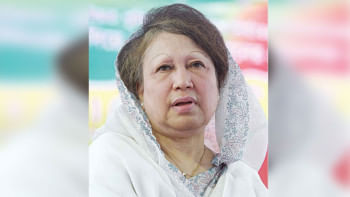'Amended ICT law to take country towards medieval age'
 Executive Director of Transparency International Bangladesh Dr Iftekharuzzaman speaks while eminent jurist Dr Shahdeen Malik is looking on at a roundtable on 'ICT (Amendment) Act, 2013: Right to Information and Freedom of Expression under Threat' at the Cirdap auditorium in the capital on Saturday. Photo: Anisur Rahman
Executive Director of Transparency International Bangladesh Dr Iftekharuzzaman speaks while eminent jurist Dr Shahdeen Malik is looking on at a roundtable on 'ICT (Amendment) Act, 2013: Right to Information and Freedom of Expression under Threat' at the Cirdap auditorium in the capital on Saturday. Photo: Anisur Rahman
Top constitutional expert Dr Shahdeen Malik has urged the government to remove the Section 57 of the ICT law, saying the clause will take the country towards the medieval age.
Speaking at a roundtable on Saturday, he said the citizens of the country hope the parliament will not pass the amendment to the Information and Communication Technology (ICT) Act-2006 as the Section 57 has made it 'ridiculous'.
The cabinet approved the draft of the ICT (Amendment) Act-2013 on August 19 proposing to empower law enforcers to arrest any person without warrant and increase the highest punishment to 14 years from minimum 7 years.
The government has later promulgated the ICT (amendment) ordinance.
According to the Section 57 of the ordinance, if any person deliberately publishes any material in electronic form that causes to deteriorate law and order, prejudice the image of the State or person or causes to hurt religious belief the offender will be punished for maximum 14 years and minimum 7 years imprisonment. It also suggested that the crime is non-bailable.
In the original ICT Act-2006, enacted by the BNP-Jamaat government, the maximum punishment was 10 years’ jail term and a fine of Tk 1 crore. And police had to seek permission from the authorities concerned to file a case and arrest any person involved in crimes covered under the law.
The roundtable styled 'ICT (Amendment) Act, 2013: Right to Information and Freedom of Expression under Threat' was organised at the Cirdap auditorium in the capital.
TIB, BILIA, Ain-o-Salish Kendra (ASK), Article 19, Manusher Jonno Foundation (MJF), Bangladesh Legal Aid and Services Trust (BLAST), Bangladesh Environmental Lawyers Association (BELA), Institute of Informatics and Development (IID) jointly organised the discussion.
In recent times, Amar Desh acting editor Mahmudur Rahman, rights organisation Odhikar’s Secretary Adilur Rahman, bloggers Asif Mohiuddin, Mashiur Rahman Biplob, Subrata Adhikari Shuvo and Rasel Parvez have been arrested in cases filed under the ICT Act.
Dr Shahdeen Malik said punishment for lying has been abolished from the world 200 years ago but the government is creating such law again which is against the secular concept of state.
Dr Iftekharuzzaman, executive director of Transparency International Bangladesh (TIB), said the parliament session is due to start very soon but before that the amendment has been promulgated as an ordinance, raising concern to all.
“It won’t create concern if our law enforcers were professional enough or could work out of political influence. There is no assurance that the law will not be abused,” he said.
The opposition party is not saying a single word and may be thinking to use it against the current government in future, he assumed.

 For all latest news, follow The Daily Star's Google News channel.
For all latest news, follow The Daily Star's Google News channel. 



Comments